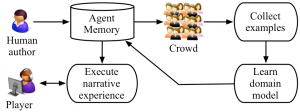Scheherazade-IF is becoming the ultimate Narrative Generating System that’s here to revolutionize story-based games
You have most likely heard a lot about Artificial Intelligence. Especially in the last few years, technology has been booming, and AI technologies have been sparking up debates about the future uses and moral dilemmas of such achievements. So far, most of AI technologies have had applications in many different sectors of human life, for example in healthcare and the automotive industry.
Could this have escaped the attention of game developers? Absolutely not: AI has been used in games in many different ways. A team of researchers in the Georgia Institute of Technology set out to implement this technology in story-based games by developing a system that automatically creates new narrative plots in interactive narrative games.
You’ve most likely played games where different options and different actions influence drastically the game’s storyline. It is not hard to imagine how much work has to be put into creating these different paths when making a game. This is where Scheherazade-IF comes in: the system creates automatically new stories using crowdsourced data; that is, data that has been created by a large number of anonymous workers through Web services. These workers’ only task is to input examples of what would happen in a particular situation in natural language. The machine can do the rest, producing from scratch an interactive narrative experience.
So does this really work better than human-tailored content? Not yet. The results are not perfect, and they are obviously dependent on the quality of data collected by the crowdsourcing workers. The AI system works on relatively simple principles, and though it does not understand the concept of actions and effects, it can utilize data as nodes and determine which ones are mutually exclusive. It has an understanding of the dynamics of a situation and of the importance of ordering events in the scale of time, and does not regard the data as simply a collection of stories. Events are marked as executed or not and this helps determine the next possible actions as the game progresses. Standstills are also prevented: in case there are no executable actions for the player to follow, the system randomly chooses an NPC to influence the story line. This means that events can happen spontaneously, even though the player has taken no action. It also means that sometimes, if they are too slow to act, these events might end in the player losing the game. This allows for a dynamic, uncertain experience.
Whereas the results of this novel way of producing narratives is not exactly up to scratch, it is evident that the combination of AI with crowdsourcing can yield exceptional results. This cooperation between humans and machines has in some cases approached the performance of human-authored content. And even though the system might lack creativity, since it generalizes according to the data offered by the crowdsourcing workers, it demonstrates that this procedure can be applied in sectors where human individuals and computation cannot work efficiently independently. Crowdsourcing, Artificial Intelligence, Collectiveness, Machine Learning might be the key-words an aspiring game developer will want to consider as technology revolutionizes the way everything works.
Original Article: http://www.cc.gatech.edu/~riedl/pubs/guzdial-fdg15.pdf
You might also like
More from Game Research Highlights
How do you want to do this? – A look into the therapeutic uses of role-playing games
Can playing RPGs contribute positively to your wellbeing? A recent study aims to find out how RPGs are being used …
Eldritch horrors and tentacles – Defining what “Lovecraftian” is in games
H.P. Lovecrafts legacy lives today in the shared world of Cthulhu Mythos and its iconic monsters. Prema Arasu defines the …
Are Souls Games the Contemporary Myths?
Dom Ford’s Approaching FromSoftware’s Souls Games as Myth reveals the Souls series as a modern mythology where gods fall, desires …
















